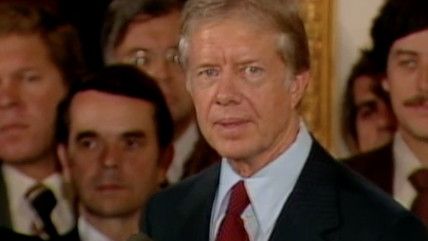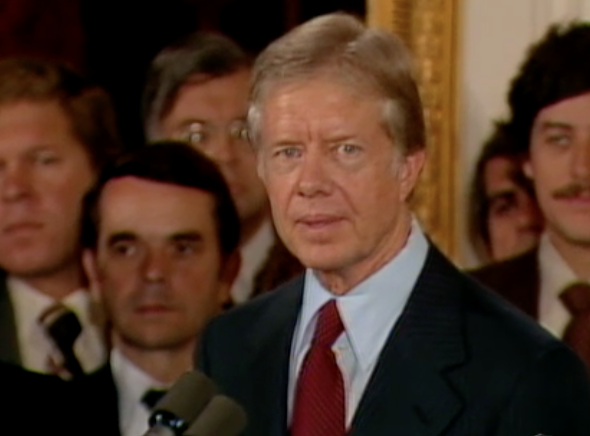Why Do We Have a Department of Education? Jimmy Carter's Debt to a Teachers Union.
Public education existed well before 1980, but an unpopular President Carter wanted the nation's largest union on his side before an election.


With Betsy DeVos just confirmed as the new Secretary of Education, it's worth taking a look back at the events that led the creation of this cabinet-level department.
Public education (including federal involvement in public education) was a thing in the United States for a couple hundred years before 1979, when Congress narrowly approved the cleaving of a new Department of Education (DoED) out of the already existing Department of Health, Education, and Welfare. But the newly created federal bureaucracy was more of a favor to a large and powerful special interest group on behalf of a beleaguered president than a necessary reorganization to allow the federal government to "meet its responsibilities in education more effectively, more efficiently, and more responsively," as then-President Jimmy Carter put it.
Upon signing the Department of Education Organization Act Statement in October 1979, Carter said:
Primary responsibility for education should rest with those States, localities, and private institutions that have made our Nation's educational system the best in the world, but the Federal Government has for too long failed to play its own supporting role in education as effectively as it could. Instead of assisting school officials at the local level, it has too often added to their burden. Instead of setting a strong administrative model, the Federal structure has contributed to bureaucratic buck passing. Instead of simulating needed debate of educational issues, the Federal Government has confused its role of junior partner in American education with that of silent partner.
Essentially, Carter's argument—similar to the argument President George W. Bush used to create the bloated, expensive, and ineffective Department of Homeland Security—is that because of all the "bureaucratic buck passing," a new bureaucracy must be created.
Creating the DoED was Carter's fulfillment of a 1976 presidential campaign promise, when he earned the endorsement of the largest labor union in the United States—the National Education Association (NEA). As the Washington Post reported in 1980:
The NEA gave its first presidential endorsement ever in 1976, when Walter Mondale promised them, at an NEA annual meeting, that the Carter administration would form an education department. At the 1976 Democratic National Convention, more delegates — 180 — belonged to the NEA than any other group of any kind. They've endorsed Carter for 1980, and were a major force in getting delegates to the Iowa caucuses…
Is the department, then, a creature of the NEA?
"That's true," says NEA executive director Terry Herndon. "There'd be no department without the NEA."
By the time the bill calling for the creation of the DoED had been passed in Congress, President Carter's approval rating was at its nadir—below 30 percent—in large part thanks to an international oil and energy crisis contributing to a tanking economy and a national "crisis of confidence."
A study of the DoED's creation by Georgia State University found that although the department "was fairly low on the list of priorities," President Carter's "Domestic Policy staff did its research, sent people to testify on behalf of the department in Congress, and hoped that their endorsement of the Department would help ensure the backing of the NEA and its members for the 1980 election."
A section on the DoED in the Cato Institute's Handbook for Congress includes a passage about the lukewarm support from even congressional Democrats for creating the DoED, who were more motivated to keep a Democrat in the White House than to create a new federal bureaucracy:
According to Rep. Benjamin Rosenthal (D-N.Y.), Congress went along with the plan out of "not wanting to embarrass the president." Also, many members of Congress had made promises to educators in their home districts to support the new department. The Wall Street Journal reported the admission of one House Democrat: "The idea of an Education Department is really a bad one. But it's NEA's top priority. There are school teachers in every congressional district and most of us simply don't need the aggravation of taking them on."
Just today, Rep. Thomas Massie (R-Ky.) has introduced H.R. 899, a one-sentence long bill which would eliminate the Department of Education in its entirety by the end of 2018. Check back later for more Reason coverage of Massie's bill.

Show Comments (114)